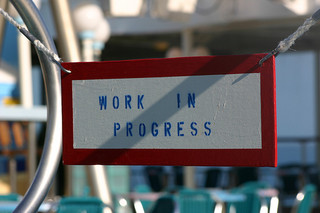In this post I will offer some advice about how to study for the bar exam while you are working a full or part-time job.
I have received a lot of emails and comments on my reader survey from people who want more advice about how to take the bar exam while balancing work (and often family) obligations.
In my opinion, successful studying for the bar exam while working requires that you start studying earlier than someone who is not working, that you create a fairly strict routine and schedule, and that you clear all other mental concerns during your study time.
Start Early
A traditional bar exam student who is not working will study 5 to 7 days a week, 8 hours per day, for 8 to 10 weeks. This works out to anywhere from 320 to 560 hours. Therefore, if you want to have the same amount of study time as someone who has no job or family obligations, you will need to start studying further in advance for the bar exam.
Thus, if you have 20 hours available each week to study, you will need to start studying 16 to 20 weeks before the bar exam.
If you can be very strategic and focused while you study, you will need less time. If you’ve passed a bar exam within the last few years, you will likely need a lot less preparation time for a second bar exam. Therefore, be sure to take these factors into account when deciding how far in advance of the test date you should begin studying.
Routine
It is important to understand your bar exam routine. As I explain in more detail in this post, a routine is the rhythm of your life, whereas a schedule is the timetable that you follow so that you will complete certain tasks within a given time limit.
By understanding your routine (i.e., when you typically do certain actions), you can find time to study for the bar exam in a focused way. Within those blocks of time, you can design a schedule to ensure you cover and review all necessary bar exam topics.
If you have a job, it is likely you are required to work during pre-defined hours and days. Obviously, you cannot study while you are working. So, you need to analyze your work routine and all other routines in your life (i.e., exercise, family dinner, date nights, religious obligations, etc.) and find empty spaces or things you can stop doing in order to make room for bar exam study.
For instance, if you work from 8 a.m. to 5 p.m. Monday through Friday, you can obviously find times in the mornings and the evenings during the week and large blocks of time on the weekends in which to study. Take time now to think through your work schedule to arrange blocks of time in which you will study for the bar exam.
Some of you who are working also have family obligations. This makes things more difficult. However, you still need to block out specific periods of time. Consult with your family members and find at least one large block of time during which they will leave you alone and maybe a few other small blocks of time that you can have to yourself.
Conversations with family about when you will study can be difficult. You may feel guilty about requesting so much time to yourself. Maybe some in your family will resent you. Take as much time as needed to discuss any problems (perceived or real) with your family so that you can study with worrying about how your family feels.
Finally, consider where you will study. The location where you do something is also part of your routine. If you live alone, you can study at home. But if you live with roommates or are married and have family, you may need to find a different place to study, such as a library or bookstore or even a coffee shop.
Clearing the mental energy
Another important and really critical part of preparing for the bar exam is being focused solely on the bar exam while you are studying. This applies to anyone studying for the bar exam, but is especially important for people who are working because they have such a limited time during which to study.
To focus well, you need to make sure everything else in your life is either taken care of or is in some sort of management system that will allow you to block it out of your mind while you study for the bar exam.
Let me explain.
First of all, there’s no such thing as multitasking. Various studies have debunked that idea. And, even if humans had the ability to multitask very simple tasks, preparing for a professional certification examination is not a simple task and it’s not something you can do while you’re brushing your teeth or taking out the garbage.
Now, this does not prevent you from listening to lectures while you’re exercising or driving. However, those should be for review purposes or initial familiarization purposes. If you think that you will be able to learn and practice what you need to know to pass the bar exam during your commute, this is probably not a good plan. I’m not saying it’s impossible, though it probably is.
One of the reasons it’s hard for people to focus is that their minds begin to wander toward the other things they have to do. This is typical when you’re doing something you don’t necessarily enjoy, such as studying for a massive test.
You might be sitting there reviewing the elements of various torts, and start thinking to yourself: I really need to pick up some bread at the store and get a birthday present for John. Then you’ll start thinking about what present you could get and what type of bread you want to buy. And pretty soon you’re down some to-do list rabbit hole for the next half an hour.
I totally get that distractions can come easily, and it happens to me more than I care to admit. But, if you can put of these thoughts and tasks into a system that allows you to keep them organized and out of your mind, then you should do it.
If you have such a system in place already, that is fantastic and please keep using it. If you don’t have such a system in place, let me recommend the Getting Things Done system.
I had heard about the Getting Things Done system for a couple of years, but never really investigated it. A few weeks ago, I finally listened to the Getting Things Done audiobook and was very impressed with the system.
While some of the GTD parts seem a bit overly complicated to me, the basic system is extremely useful and can be summarized as follows:
- You take all of your tasks and thoughts about anything and everything, including what you need to do, and write each of them on a separate piece of paper and put them in a pile called your “in-box”.
- You do this until everything is out of your head and you have a giant stack of paper.
- Then, you process your in-box on a regular basis (I’d recommend at the end of each day) and classify your items. Whether you can do it in two minutes (if you can, then do it), whether you need to defer or delegate it, or whether you can just put it away and look at it at a later date.
- Then, you create folders for the deferred tasks by name of the task. You store these folders in alphabetical order in a file cabinet for easy reference as needed.
- Any items that must be completed on a particular day, you put on your calendar.
- Then each day you look at your calendar and your to-do folder and do those things that are necessary.
(This is just a simple overview of the GTD system. If you would like details, I recommend you read the book.)
As you can see, this system allows you to get all your tasks out of your brain and onto pieces of paper that you can consult at specific moments of the day. (You could of course use this system with some sort of electronic organizer, such as Evernote or Google Calendar, rather than pieces of paper.)
Back to the example of needing to get bread. If you used the GTS system, when the thought pops into your head, you would write down on a piece of paper “get bread” then toss it into your in-box. Then, when you process your inbox, you would put that piece of paper into your “Groceries” folder. Then when it’s time to go grocery shopping for the week you will grab the “Groceries” folder, take all the pieces of paper and make a grocery shopping list and then go to the grocery store. (The same process would occur with the “buy present” thought.)
I highly recommend the GTD system. It is made my life at work and at home a lot simpler and more stress-free because I’m not always worrying about things I need to do because I have already written them down and I trust the system.
Conclusion
Preparing for the bar exam can be difficult. When you add work and family obligations, it becomes even more so.
I hope this post has given you some helpful advice on how to make the process go more smoothly.
P.S. -- Want a FREE copy of my Bar Exam Mind audiobook?
You can get a free copy of my audiobook when you sign up for a free trial at Audible. Get the details by clicking here.







